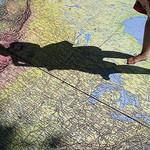When my great-grandfather came to the United States in the early 1900s, his last name was altered (at least one letter was dropped) either because the immigration agent couldn’t spell the name correctly or thought it was too “ethnic.” Later, my great-grandfather considered changing his last name all together to something more “American” so that his machine-shop business would be more successful (the family story goes that he was told Wojinski was just too “ethnic” to be placed on a business and then expect that business to be successful).
When I was a senior in high school one of my teachers had difficulty pronouncing my last name, so she shortened it to Wojo and the name has been with me ever since. Even my first name was unusual as I never encountered another Natalie in 12 years of public education. I went to school with Kate, Kim, Jenny, Brenda, Renee, Patricia, Janice, Cindy and the like. Oh, how I wished for such an elegant name. For a few years I lived down the street from Maj and Kaj (sister and brother, prounounced ‘my’ and ‘kye’). Their mother was of Norwegian descent and she wanted to celebrate her family heritage. Those were the most unusual names I came across before adulthood.
Individuals aren’t given names for no reason at all. Perhaps you’re named after an ancestor or someone famous (i.e. I’m Natalie in part because my mother really liked the actress Natalie Wood in the movie West Side Story). Perhaps your parents argued over what your name should be, couldn’t decide and ended up combining two names into what you have today (i.e. the daughter of David and Victoria is Dava). Maybe you’re named after a parent’s best friend from kindergarten or the nurse in the hospital where you were born. Maybe your parent knew for years that their first child, first son, first daughter would have a certain name. Perhaps your name celebrates your family’s heritage.
Sometimes we hear names that are unfamiliar to us and we laugh. One video I have shown in my history classes has frequently generated giggles from students because the names of the people are unfamiliar. I am frequently asked how they could get such weird names (think Temujin, Zheng He, Mansa Musa, Ibn Battuta, Lothair, Hildegard). My response is usually something along the lines that those historical figures would probably find OUR names very strange and worth several laughs. But really, what does it mean when we laugh at someone’s name? Are we being disrespectful to that person as well as their families? Do we form opinions about people based on their names and whether or not WE find them to be ‘normal’? What if we or someone we meet has a name that is usually associated with the opposite gender? Think about these names: Stacy, Leslie, Tracy, Brett, Morgan. Are those girl’s names or boy’s?
What do you think? Leave a comment here describing the story of how you got your name or, if you have an uncommon name, how you feel about having a name no one else has. You could also leave a comment about our responses to names. Is it fair to laugh at someone’s name because it’s different from our own? Or look up what your name means and let us know. You can try the Concise Dictionary of First Names or Behind the Name to get started.
